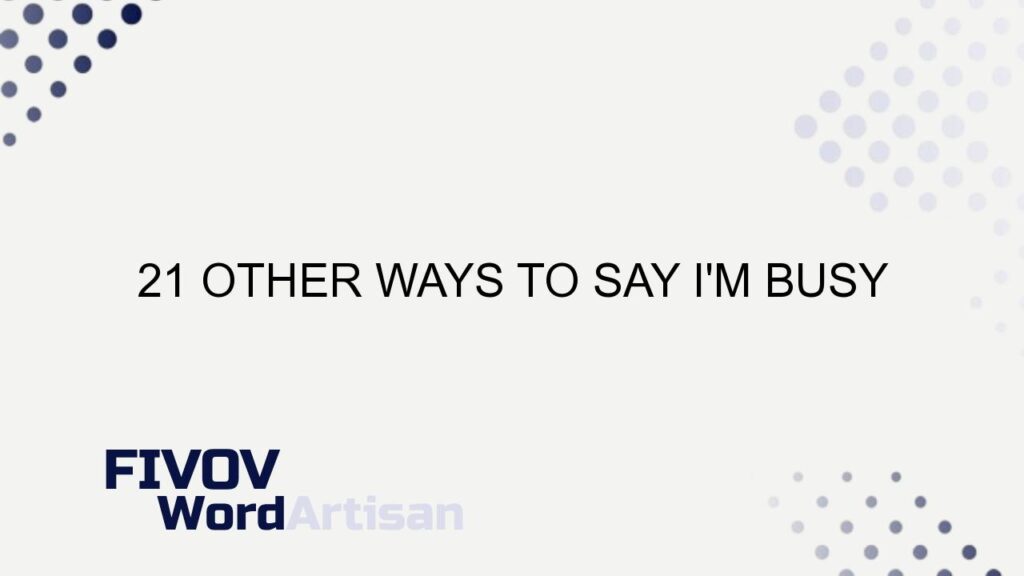Are you attempting to determine if something is feasible but find yourself needing to inquire first? Maybe you’re concerned that the phrase “I’m busy” might not be the most professional way to ascertain if an action can be undertaken.
MY LATEST VIDEOS
Well, you’ve come to the right place to find out more. This article will show you how to professionally say “I’m busy” when you need it.
Other Ways to Say “I’m Busy”
When it comes to expressing that you are preoccupied or have prior commitments, there are a variety of ways to convey this message in a professional and courteous manner. Whether it’s in a work setting, when dealing with clients or colleagues, or even in personal conversations, it’s important to have a repertoire of alternative phrases to convey the same sentiment. Here are 21 other ways to say “I’m busy” that can help you communicate your unavailability with tact and professionalism.
1. Currently Engaged
One effective way to indicate that you are occupied without sounding dismissive is to use the phrase “currently engaged”. This communicates that you are already involved in a task or activity and sets a professional tone in your response.
2. Occupied at the Moment
Expressing that you are occupied at the moment conveys a sense of immediacy and implies that your focus is currently committed to another task or responsibility.
3. In the Middle of Something
When you want to communicate that you are in the midst of a task or activity, using the phrase “in the middle of something” effectively conveys your current state without sounding abrupt.
4. Tied Up
The phrase “tied up” is a commonly used expression to convey that you are currently busy or engaged in something that requires your attention.
5. Preoccupied
Utilizing the term “preoccupied” indicates that your attention is already directed towards something else and communicates a sense of focused involvement.
6. Otherwise Engaged
When you are not available due to being engrossed in another commitment, using the term “otherwise engaged” presents a polite and formal way to express your unavailability.
7. Engaged with Prior Commitments
This phrase communicates that your current engagement is a result of pre-existing commitments, suggesting a sense of responsibility and prior planning.
8. Deeply Engaged
Expressing that you are “deeply engaged” indicates a high level of involvement in the activity, conveying a strong sense of your current focus and attention.
9. Actively Involved
When you want to convey that you are actively participating in a particular task or project, using the phrase “actively involved” effectively communicates your current level of commitment.
10. Committed to a Task
This phrase communicates that you are dedicated and devoted to a specific task, indicating a sense of responsibility and attentiveness to your current engagement.
11. Currently Occupied with a Prior Engagement
By mentioning that you are “currently occupied with a prior engagement”, you convey that your current commitment is a result of a prearranged obligation.
12. Engaged in a Project
When you are occupied with a specific project or assignment, using the phrase “engaged in a project” effectively communicates your current involvement and focus.
13. Not Available at the Moment
This phrase conveys that you are presently unavailable, indicating that your attention is currently directed elsewhere.
14. Devoted to a Task
If you are committed to a particular task or responsibility, using the term “devoted to a task” effectively portrays your dedication and focus.
15. Fully Committed
By expressing that you are “fully committed”, you convey a strong sense of dedication and involvement in your current task or engagement.
16. Immersed in Work
The phrase “immersed in work” indicates a deep level of involvement and focus on the task at hand, effectively communicating your current busyness.
17. Engrossed in a Task
When you are deeply engrossed in a specific task, using the phrase “engrossed in a task” effectively conveys your high level of involvement and attentiveness.
18. Engaged in a Time-Sensitive Project
This phrase communicates that you are currently involved in a project or task that is time-sensitive, implying a sense of urgency and commitment to the specific engagement.
19. Currently Committed
Expressing that you are “currently committed” indicates that your focus and attention are dedicated to a specific task or responsibility at the present moment.
20. Execution of Prior Obligations
The phrase “execution of prior obligations” communicates that your current engagement is a result of pre-existing commitments, suggesting a responsible and planned approach to your unavailability.
21. Engaged in a Task
When conveying that you are currently occupied with a specific task or responsibility, using the phrase “engaged in a task” effectively communicates your current focus and involvement.
Utilizing these alternative phrases to communicate your unavailability can help you maintain a professional demeanor while effectively conveying your current engagements. By expanding your vocabulary and varying your responses, you can ensure that your interactions are polite, respectful, and considerate of the other party’s time and expectations.
professional communication in Business and Personal Interactions
In both professional and personal settings, effective communication is essential for building and maintaining positive relationships. When expressing your current unavailability, whether it’s in a professional environment or during personal interactions, using professional and courteous language can help convey your message with clarity and respect.
FAQs
How can I politely say that I’m busy?
You can politely convey that you are busy by using phrases such as “currently engaged”, “occupied at the moment”, or “in the middle of something”. These expressions communicate your unavailability while maintaining a polite and professional tone.
Why is it important to use professional language when expressing busyness?
Using professional language when expressing busyness is important as it reflects courteous communication and respect for the other party’s time and expectations. It also contributes to maintaining positive interactions and relationships in both professional and personal contexts.
Conclusion
Effectively communicating your unavailability in a professional and courteous manner is an important aspect of interpersonal interactions, both in business and personal settings. By incorporating alternative phrases to convey your busyness, you can maintain a respectful and considerate approach while effectively communicating your current engagements. Adapting professional language when expressing your unavailability contributes to positive communication and relationship-building, enhancing interactions and fostering mutual respect.




